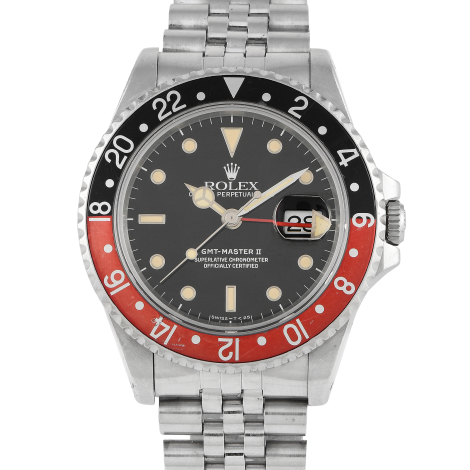Rolex
Section 1 - History
If you haven’t ever heard about Rolex, then probably you are dead.
Rolex today is the most famous watchmaking company in the world - but despite its huge reputation, it is a very late newcomer to the horology field, having been founded in London in 1908 as Wilsdorf & Davis, by Hans Wilsdorf and Alfred Davis.
The company switched its name to Rolex in 1915 and was transferred to Geneva, Switzerland, in 1920. Since 1960, the company has been owned by a private family trust, the Hans Wilsdorf Foundation.
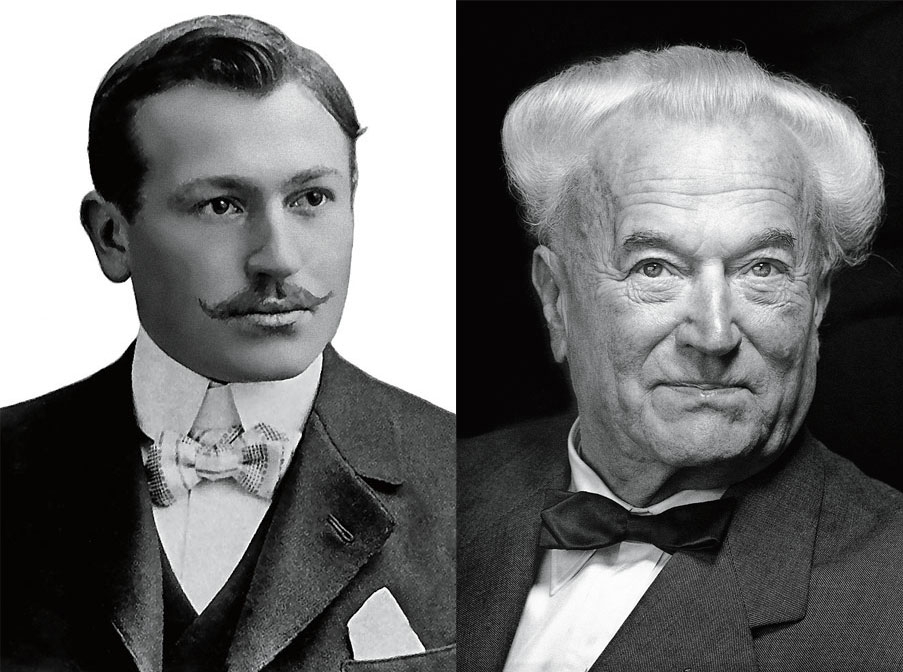
The two founders of the watchmaker were brothers-in-law, and originally they just assembled watches: they imported movements from Switzerland (made by Hermann Aegler) and placed them inside cases made in the UK. Their first production was often sold to jewelers, who branded the watches as theirs, while the W&D brand was stamped inside the case back.
But the company grow fast, and became a respected watchmaker quite soon, specializing in several key fields: the chronometer certification; the creation of water-resistant watches; the evolution of the automatic movement, which until then was still rudimentary; and the development of the antimagnetic capabilities of watches.
The company was the first to manufacture a personal watch that was so precise it earned the qualification of “chronometer”, in 1915: before that, this feat was only reserved to marine chronometers.
In 1926, it manufactured the first Oyster, featuring a water-resistant case, and the watch was worn in 1927 by a woman, a young British swimmer called Mercedes Gleitze, during her crossing of the English Channel. The crossing lasted over 10 hours, during which time the watch remained in excellent condition.
Most possibly, Rolex also invented then the concept of the “testimonial” in horology advertising, as it posted an ad in a newspaper to publicize the feat.
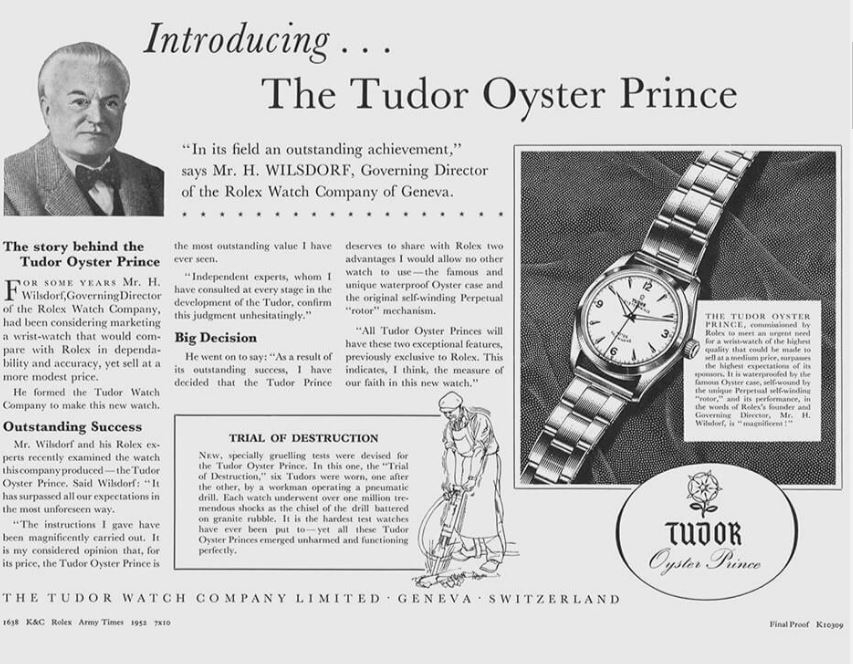
In 1931, Rolex launched a self-winding watch with a central rotor that could freely rotate on its axis, charging the main spring, improving decisively the previous solutions implemented by other manufacturers.
Actually, most Rolex notable achievements were improvements over other companies’ achievements - but the company of the Crown just made them better. This happened also with the changing date on the dial of the Datejust, in 1945, and the two timezones tracking of the GMT Master, in 1954.
But the main Rolex achievement was the creation of watches such as the Submariner, one of the first in the market to be water-resistant to the (back then) astonishing depth of 100 meters.
The company did even better in 1960. A special model, the so-called DeepSea, was secured to the hull of the bathyscaphe Trieste, which reached the bottom of the Mariana trench, at 11.000 meters. The Commander, Jacques Piccard, confirmed that the watch survived the ordeal.
In time, what were known and used as “tool watches” surged to become a status symbol worldwide - and today the company enjoys its reputation of being the most well-known watch manufacturer of the world.
Section 2 - Iconic pieces
1 - Oyster Perpetual line
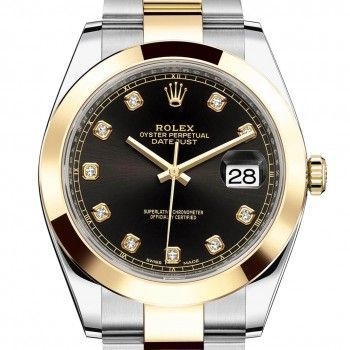
The modern-day Oyster Perpetual line is the direct heir of the original Oyster of 1926, and so, it is the longest-running series of watches by the company. The Oyster was the quintessential Rolex watch before the advent of the Professional line, which in a way stole the limelight from it, and is made in many different configurations, both for men and ladies, ranging from 26 mm to 39 mm.
Its name perfectly symbolizes the concept of water resistance and ruggedness. The Oyster and its case is a milestone in the history of contemporary watchmaking, thanks to the patented system with a bezel, a case back requiring a special tool to open it, and a winding crown screwed onto the case middle: a symbol of water resistance and robustness, and a model of proportion and elegance.
The Oyster Date/Datejust line mounts different calibers, every one manufactured by the same Rolex company, and featuring the Parachrom hairspring and the Paraflex shock-absorbing device. The cases are available in stainless steel (of the 904L variety, which was introduced in horology by Rolex), bi-metallic with stainless steel and precious metal, or in precious metal (gold or platinum). There is also the option of adding diamonds on the dial and bezel.
The Datejust II, released in 2009, has a bigger case, reaching 41 mm, but is in every other aspect quite similar to its smaller relative.
In this line, we also find the “odd guy”: the Milgauss, a watch that was specifically designed in 1954 to meet the needs of researchers and engineers, featuring reliable protection against magnetic fields of up to 1,000 gauss.
2 - Oyster Professional line
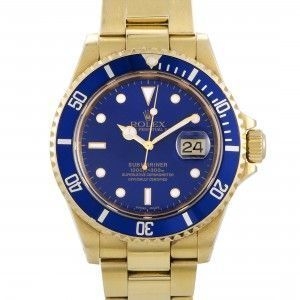
The Professional line is what Rolex is most famous for today: the models devised to serve the needs of the “professionals”. Persons who, in the eye of Rolex, are adventurers, needing a precise, sturdy watch to accompany them through their adventures on earth, water, and sky.
The collection started around mid-1900 with the launch of the Submariner, a watch designed for the needs of the deep divers, which had a huge success, also because it was the watch chosen by none other than Mr. Bond.
James Bond.
After the introduction of the Submariner, the company followed up with the Sea-Dweller, even more performing in the liquid element, equipped with a helium-escape valve developed in cooperation with another Swiss watchmaker, Doxa.
For the ones who like to stay on the surface of the water instead, Rolex in 1992 developed the Yacht-Master, which in its second version, the Yacht-Master II, features an innovative complication so to set up a countdown timer through the use of the bezel - the ultimate function for regatta sailing.
The Explorer was instead developed for the needs of the explorers who had to confront with rough terrain - like mountains and caves. In fact, the Explorer came concurrently with the famous Everest expedition, where a Rolex Oyster, worn by Sherpa Tenzing, made it to the highest mountain of the world. The Explorer was followed in 1971 by the Explorer II, its revised edition.
The GMT Master, introduced in 1954, was developed for timekeeping in two different timezones, at the request of PanAm airways which wanted its pilots to accurately track the local time against the GMT - Greenwich Mean Time - the reference for navigation in intercontinental flights.
3 - Cellini line
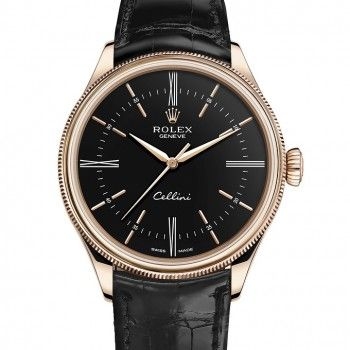
The Cellini is the Rolex line of dress watches. Named after the famous Italian goldsmith and sculptor of the Renaissance, Benvenuto Cellini, this line is dedicated to the tradition of watchmaking excellence.
The line was discontinued for a long time, but in 2005, Rolex decided to revive and expand it, adding several references and introducing new and interesting complications which came almost unexpected from the House of the Crown, like a recently-presented moon phase, so to attract the crowd of the more refined watch enthusiasts.
Section 3 - News
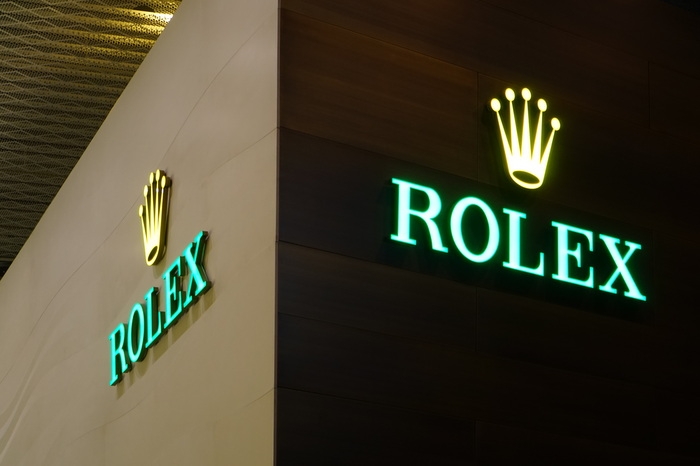
It is not breaking news that Rolex is very tight-lipped about its current aims, and pretty much conservative as to its launches. During the last Baselworld 2019, there were hardly any surprises, mostly cosmetic changes to its models.
In short, the company has displayed a new Yacht-Master in 42 mm size in white gold and a black Cerachrom bezel; the GMT Master “Batman” has been presented with a Jubilee bracelet, and the white gold reference can be had with a (beautiful) meteorite dial, while two other models have been discontinued.
Also, the Sea-Dweller has gained a new version, a bi-metallic case with black Cerachrom bezel.
But what is more important, for observers like us, is the slow development of the Cellini line. The new Moonphase is, bar the SkyDweller, the most complicated Rolex timepiece in production.
It seems that nowadays, the watchmaker is preparing to directly compete in the market which has always been out of its reach, the dress watch market. And while the moonphase feature has been installed as an add-on over an existing caliber, we know that one of the main areas in which Rolex has always been a pioneer in the engineering department.
So, we cannot rule out that the development of the Cellini will be the new emerging trend for Rolex.
Section 4 - Gossip/Style

Sept 2018 - Between the watches Marshall Bruce Mathers III wears, which are mostly Casio G-Shocks, you can also find the Oyster Perpetual Datejust in simple stainless steel with Roman numerals - an understatement if there’s ever one.
And if you do not readily remember who Marshall Mathers is, well, he is also known with the public name of Eminem.

Feb 2019 - You can afford to go wild even with a Rolex, as actor Nicolas Cage displays. He has been spotted wearing a Rolex Daytona with a Diamond and Sapphire Bezel; Reference - 116598 SACO. With its leopard dial and wristband, and the gold case adorned with diamonds and yellow sapphires, for sure this is a watch that you are bound to notice.

Jun 2019 - He might not have won the last Champions League, but the football star Cristiano Ronaldo, nowadays playing for Juventus, is not shy about displaying his attitude towards watches. He was spotted wearing an 18KT Gold Rolex GMT Master II with a Sapphire and Ruby Bezel. Reference-116758SARU: not really understated, that is, but with his yearly incomes, which are said to hover around the 100-million mark, CR7 can afford to go public and bold.
Section 5 – Current Most Popular Models
The most sought-after models of the watchmaker are without doubts three, belonging to the Professional line.
The first two are the Submariner and the GMT Master II - and they are so sought after that the waiting list to buy one has reached a staggering amount of over seven years in the most popular references, especially the ones in Rolex steel - the 904L.
Between the most famous variants inside the lines, in the Submariner, we find the green dial and green bezel version, called the “Hulk”, while in the GMT Master we find the two bi-color bezel versions, the blue and red “Pepsi” and the black and blue “Batman”.
However, it must be noted that the true object of desire nowadays is the Rolex Daytona, the chronograph timepiece that is seen at the wrist of everyone who wants to make a lasting impression on its onlookers. The Daytona, which exchange prices on the used market are bordering on the crazy side, has scored in October 2017 an all-time record: the costliest watch of the planet.
This staggering amount of money - over 17 million USD - was paid for the Rolex Daytona gifted in 1968 by Joanne Woodward to his husband, Paul Newman, with a personalized etching on the case back, “Drive carefully”. Joanne was referring to Paul’s passion for fast driving - and his performance as an actor in the “Winning” movie where he played the main character, the pilot Frank Capua.
The reference, with its cream dial, black subdials and stylish orange “Daytona” over the subdial at six, during the years, became famous as the “Paul Newman”, and represents one of the most desired (and costly) versions of the Daytona today.
Section 6 – Current Approximate Price List By Line/Model
The Oyster line
The Oyster line is divided into different sub-lines, ranging in size from 26 to 39 mm, and arriving at 41 mm in the case of the Datejust II.
The entry model into the Rolex world is the Oyster Perpetual, which has no options apart from the size.
The Datejust introduces the date, at three, and a huge variety of different options (bracelets, dials, metals, bezels, even gemstones) to personalize it.
| Oyster Perpetual | |
| Type: | Luxury Sports Watch |
| Material: | Stainless Steel |
| Functions: | Automatic |
| Price: | The stainless steel Oyster Perpetual averages in price around the $5.000 USD mark, depending on size. |
| Oyster Datejust / DayDate | |
| Type: | Luxury Sports Watch |
| Material: | Stainless Steel, Bi-Metallic, Precious Metals, Gemstones |
| Functions: | Automatic, Date |
| Price: | The basic Datejust starts from $6.400 USD for the stainless steel version, reaching $11,200 USD for the bi-metallic steel and gold version, up to $26,200 USD for the yellow gold version, upwards for the versions studded with gems. |
| Oyster Milgauss | |
| Type: | Luxury Sports Watch |
| Material: | Stainless Steel |
| Functions: | Automatic, Antimagnetic |
| Price: | The present-day Milgauss, which has resumed production in 2007, is the modern evolution of the original of 1957. It starts at $7,100 USD onwards. |
The Professional Oyster line
As said, the Professional Oyster line groups all the Rolex models dedicated to specific functions. So, we find here everything from diver watches to chronographs, to dual-zone timepieces. The line is based on the original Oyster case and generally features a rotating bezel.
| Submariner | |
| Type: | Luxury Sports Watch |
| Material: | Stainless Steel, Bi-Metallic, Precious Metals, Gemstones |
| Functions: | Automatic, Date, Double Timezone |
| Price: |
The modern-day Submariner is very similar to the original of 1953 and is possibly the most recognizable watch in the world. The base Submariner, the no-date in stainless steel, is sold for $7,500 USD while the date version retails for $8,500 USD. A special version, like the Hulk, with the green dial and bezel, retail for $11,500 USD. The bi-metallic option, in gold and steel, retails for around $15,000 USD, while the precious metal ones from around $27,000 onwards. |
| Sea-Dweller | |
| Type: | Luxury Sports Watch |
| Material: | Stainless Steel |
| Functions: | Automatic, Date, Helium Escape Valve |
| Price: |
The Sea-Dweller and its advanced version, the Deepsea, are the ultimate diving watches. Both can withstand enormous pressures - the first, 1.220 mt. and the latter, 3.900 mt. The current Sea-Dweller, the stainless steel 50th Anniversary, retails for $14,700 USD - the same price as the Deepsea. The previous versions are much sought by collectors and can reach even $25,000 USD, if in good condition. |
| Oyster Perpetual | |
| Type: | Luxury Sports Watch |
| Material: | Stainless Steel |
| Functions: | Automatic |
| Price: | The stainless steel Oyster Perpetual averages in price around the $5.000 USD mark, depending on size. |
| GMT Master | |
| Type: | Luxury Sports Watch |
| Material: | Stainless Steel, Bi-metallic, Precious Metals, Gemstones |
| Functions: | Automatic, Date, GMT |
| Price: |
The GMT Master is quite similar to the Submariner, featuring the GMT complication on the dial. The GMT Master in stainless steel starts from 9.200 USD and rises up a bit in the colored versions of the bezel, the “Pepsi” and the “Batman”, reach the 10.000 USD and 11.000 USD respectively. The bi-metallic version retails for around 16.500 USD. The gold version with the Pepsi bezel retails at around 32.500 USD, onwards. |
| Cosmograph Daytona | |
| Type: | Luxury Sports Chronograph |
| Material: | Stainless Steel, Bi-metallic, Precious Metals, Gemstones |
| Functions: | Automatic, Date, Chronograph |
| Price: |
The Daytona is the most sought-after Rolex watch. It is offered in a huge variety of styles and components, so to satisfy every kind of request. The “base” version, the Daytona stainless steel, has a list price of around 15.400 USD, while the ceramic bezel one reaches 20.500 USD. The yellow gold version goes for 27.200 USD, onwards. And a “Paul Newman” (not his own, of course) from the same period would set you back from 100.000 USD onwards. |
| Explorer | |
| Type: | Luxury Sports Watch |
| Material: | Stainless steel |
| Functions: | Automatic, Date, 24 Hours Display |
| Price: |
The Explorer is the perfect watch for mountaineering and related activities, such as underground exploration, as it displays a second hour hand. The current series is very similar to the previous one, which was known as “Freccione” (big arrow) The basic version is available for 7.900 USD. Old versions in good shape can easily reach up to over 20.000 USD onwards. |
The Cellini line
The Cellini has been brought back into Rolex lineup recently, and it features its dress watch offerings - that is, without the ubiquitous Oyster case. As for that, the company has presented several interesting timepieces that evoke the offerings of Rolex before the introduction of the Oyster and Professional Oyster lines, which took the market by storm.
| Cellini | |
| Type: | Dress Watch |
| Material: | Gold |
| Functions: | Automatic, Date, Moonphase |
| Price |
The current Cellini line is composed of four references, ranging in price from 12.700 USD for the base reference to 24.500 USD for the moonphase. |
The second-wrist Rolex watch market
Everybody is aware that the current waiting list to buy the most popular timepieces, which spans several years, is driving the prices of the second-wrist market way upwards so that you are happening to find them at a higher price than the list price, especially for the most popular models.
However, there are the first signals of cooling of this trend: that is, the second-wrist market is beginning to show the first signs of saturation as well.
This will not turn the value of used Rolex to zero overnight, but the asking prices are beginning to slowly decline.
So, if you had the intention of turning your passion into an investment, we advise you not to, since the “bubble” is showing the first signs of a weakening. Much better to buy a watch because you actually use and enjoy it, trust us.
Section 7 – Blog Posts
How Does The Rolex Waitlist Work? Can It Be Avoided in 2019?
The typical telephone call to the nearest Rolex retailer is usually answered by a very polite and professional retail assistant with a “I am afraid that the waiting list for this model (substitute any model in very short supply and high desire) is around five years long”.
But how did this situation come to be? What happened in the distribution model of Rolex to cause this whole issue? Was it always like that? Can it be avoided?
To answer these questions, we need to understand a bit more about the distribution system of the whole sector before being able to comment on it.
So, bear with us with this somewhat long marketing excursion – it will be enlightening, we promise.
Read More...
Section 8 – Q & A
Is it worth it to buy a Rolex watch?
Depends on what you expect from the watch. Some Rolexes (sports models in stainless steel), hold their value extremely well. Some don't hold their value at all. If you have bought Rolex Daytona in stainless steel new, 4 years ago, you would be able to sell it now, for 2x as much as you have paid for it. If you have bought the same watch in 18 ct gold, it would have lost nigh on 40% of it’s value in the same period. Read More
https://www.quora.com/Is-it-worth-it-to-buy-a-Rolex-watch
Why are Rolexes so expensive?
Rolex watches are expensive for two reasons: One is the cost of the brilliant advertising and marketing campaigns are part of the price of Rolex watches. The other is that there is such a high demand for new, used, and vintage Rolex watches that demand exceeds supply. Additionally, Rolex is quite popular with watch collectors. Altogether, this is why Rolex watches are expensive. Read More
https://www.quora.com/Why-are-Rolexes-so-expensive
How much does the cheapest Rolex watch cost?
It depends if you buy new or pre-owned, but the most affordable Rolex watch is the Oyster Perpetual range. The original Oyster was first released in 1926 and was the first mass-produced water-resistant (100m) and dustproof watch with a 904L stainless steel case. Read More
https://www.quora.com/How-much-does-the-cheapest-Rolex-watch-cost
What is the best Rolex to own?
There is nothing like the "best" Rolex. Rolex watches are extremely solid watches with a variety of functions. However, models like Submariner, GMT Master II-C, Daytona, Sea Dweller, DSSD stand out in the lot. There is however one model which is kinda exceptional and is always much respected among all other models. It is called the Day-Date with the presidential bracelet. Read More
https://www.quora.com/What-is-the-best-Rolex-to-own
If I buy a Rolex today and keep it in a perfect condition for 50 years, how much would it cost and would it be a wise investment?
It is pretty much true that during the last ten years the prices for Rolex watches have grown like crazy, especially in the second-wrist market, which is fueled by the scarcity of popular models (mainly, the stainless steel Submariner, GMT Master, and Daytona). Read More

